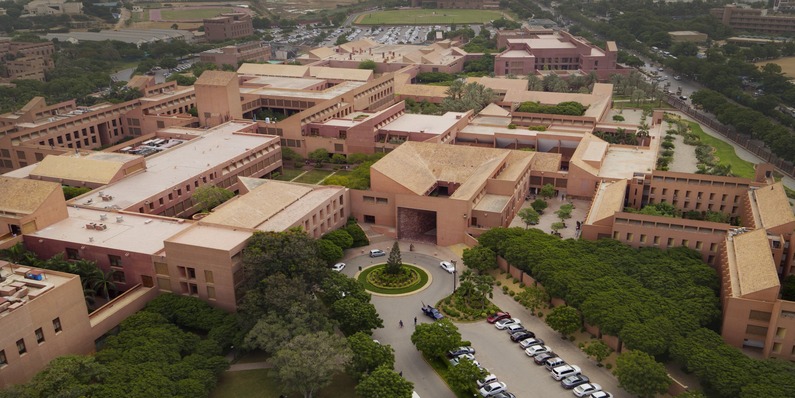
The prestigious Journal of Postgraduate Medical Education, published by Oxford Academic, has published a review of the Aga Khan University Medical College’s (AKU-MC) impact on medical education and healthcare in Pakistan, highlighting its 40-year journey of excellence and partnerships. The article is titled ‘A Journey of Innovation: 40 years of Pioneering Medical Education at the Aga Khan University Medical College in Karachi, Pakistan’.
Established in 1983 as Pakistan’s first private university, AKU has grown into a global institution focused on improving healthcare standards and addressing healthcare needs in the developing world. The paper describes in detail its flagship programme, the five-year Bachelor of Medicine, Bachelor of Surgery (MBBS), which is renowned for pioneering medical education in Pakistan by introducing problem-based learning, team-based learning, and innovative patient simulation methods. The MBBS journey began with 50 students and has grown to admit 100 students annually, totaling 2,888 graduates to date.
The review explains how AKU Medical College integrates research early on, assesses clinical clerkships uniquely, prioritizes holistic student development, and exposes students to community dynamics and public health through its urban health programme. To address healthcare gaps, psychiatry, family medicine and geriatrics have been included to the MBBS certification curriculum. It further highlights that AKU-MC has received several awards for curriculum excellence, faculty engagement, and assessment rigor; in 2023, it earned the prestigious ASPIRE Stellar Award, highlighting its commitment to providing a world-class medical education. Closing the accessibility gap while enhancing quality of care has been a guiding principle throughout.
The paper also looks at AKU’s Postgraduate Medical Education (PGME) programme, which focuses on academic and clinical training for physicians and includes internship, residency, and fellowship programmes, with 3,983 graduates to date. The programme has influenced postgraduate programmes across Pakistan, serving as a model for other institutions, with many of these programmes being unique and one-of-a-kind in the country. The publication mentions several notable achievements, including pioneering residency programs in anesthesia and family medicine, unique fellowship programmes, advancements in radiology and internal medicine, and a landmark accreditation from ACGME-I.
AKU-MC alumni hold key positions in Pakistan’s healthcare sector, both locally and internationally. Grounded in a curriculum that emphasizes community impact, graduates become social impact entrepreneurs, co-founding major healthcare initiatives, and many contribute to leading cardiac facilities, research organizations, and specialized centers, reflecting AKU’s commitment to creating a high-impact healthcare ecosystem.
The institution’s mission focuses on developing socially conscious healthcare professionals who give back to their communities. Approximately half of AKU’s clinical faculty are PGME alumni. Moreover, alumni stay engaged through a robust alumni relations programme, including collaborations with the Alumni Association of North America. AKU graduates are widely recognized as among the world’s most influential scientists and have also made significant contributions during the COVID-19 pandemic.
“It is unusual for a peer-reviewed journal to allow publication that reviews progress of a singular medical university. We are grateful that the editors allowed this with the intention that this would allow other institutions to analyse AKU’s experience and adapt it for their own success. It is so heartening to see how this journey has unfolded over the past 40 years which is a testament to what is possible in Pakistan if strong foundations are laid, and I am grateful to the countless individuals who contributed to the success of the medical college and the greater University it is a part of. I look forward to many more decades of service.” expressed Dean Adil Haider.
Additionally, AKU’s Department of Continuing Professional Education (DCPE) is critical in addressing the demand for ongoing professional development among healthcare professionals in Pakistan. It became Pakistan’s first university-based programme to be accredited by the US-based Accreditation Council for Continuing Medical Education (ACCME), which emphasizes balance, independence, and evidence-based knowledge delivery. Utilizing virtual platforms, the CME programme’s participation has grown significantly, reaching almost 100,000 participants as of 2022.
Meanwhile, AKU’s Department for Educational Development (DED) focuses on effective delivery of teaching and learning strategies, curriculum development, and faculty development in Health Professions Education (HPE). The Examination Cell, an integral part of DED, ensures the reliability and validity of undergraduate and postgraduate examinations through robust mechanisms such as question review by multidisciplinary teams. Faculty development initiatives such as the Introductory Short Course and Master’s in HPE help faculty members build capacity by focusing on teaching fundamentals, assessment, and feedback.
Established as a pioneer, AKU has not only raised healthcare and medical education standards, but also influenced policy and practice, resulting in improved healthcare quality in the region. As it celebrates its 40th anniversary, AKU’s commitment to excellence serves as an example for institutions aspiring to make a significant impact in low- and middle-income countries.
link







